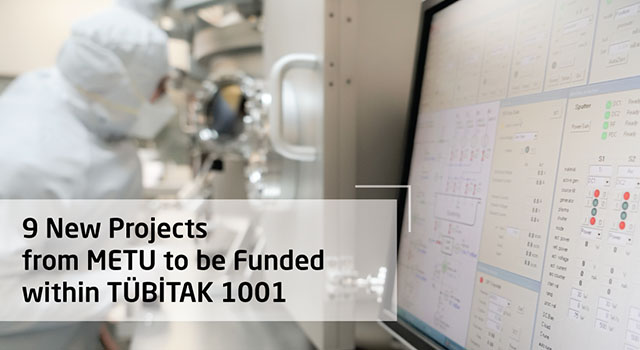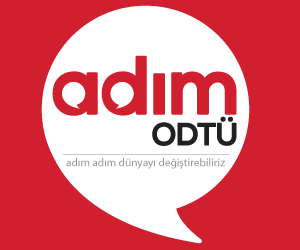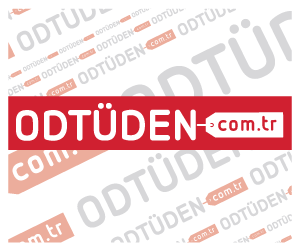
Application results for the second term of 2021 of TÜBİTAK (Scientific and Technological Research Council of Turkey) 1001 Research Support Program have been announced. Nine projects conducted by the researchers at METU have been entitled to be funded this term. METU was among the top three universities with the most project proposals supported in this call, while the success rate of METU within itself was 19 percent.
Within the second term call of the year 2021, five projects in the field of Chemistry-Biology, and one project each in the fields of Health Sciences, Social Sciences, Agriculture, and Earth Sciences will be carried out at METU.
Here are the projects found eligible for funding and the researchers conducting them:
Chemistry and Biology:
Assoc. Prof. Özgül Persil Çetinkol (Department of Chemistry)
Analysis of G-Quadruple Helix, I-Motif and Double Helix DNA Structures Formed by the PIM1 Gene and the Interaction of These Structures with Anticancer Agents
With this project, it is aimed to understand the DNA structures formed by the PIM1 gene and to shed light on the development of new drug candidate molecules targeting these structures. It is known that the PIM1 oncogenes, which are seen more than average in triple-negative breast cancer (TNBC) tumors according to recent scientific studies, form G-quadruplex-duplex hybrid type secondary structures. Firstly, the effects of environmental conditions on PIM1 G4, i-motif, and duplex hybrid structures will be analyzed. By doing this, the selectivities of existing anticancer agents such as Mitoxantrone, BRACO-19, Doxorubicin, and RHPS4 against these structures and their interactions with these structures will be examined in detail by using the methods of spectroscopy and molecular simulation. The project that is expected to last 28 months will be conducted by Dr. Özgül Persil Çetinkol, Dr. İlke Uğur Marion, Dr. Antoine Marion, and their affiliated research groups in collaboration.
Assoc. Prof. Evangelia Pişkin (Graduate School of Social Sciences)
An Investigation on the Origin, Diversity, and Mobility of the Sheep and Goat Flocks from the Hittite City of Şapinuva through Hittite Tablets, Isotope, and Ancient DNA Analyses
The project focuses on the genetic diversity, mobility, and the origin of sheep and goats with the data obtained from the excavations carried out in the Late Bronze Age Hittite city of Şapinuva. In addition to being an important religious and administrative center of the Hittite Empire, Şapinuva was also a hub of animal raising and a city in which animals were used for trade and tax-paying purposes. With this project, it is aimed at finding out the scale and direction of these processes using the evidence from various disciplines, in particular, zooarchaeology, isotope analysis, aDNA, and the translation of the Hittite tablets found in the city. Several researchers from Hitit University, Istanbul University, and Ege University will participate in the project that will last for 30 months.
Assoc. Prof. Çağdaş Devrim Son (Department of Biological Sciences)
The Role of the G-Domain in the Homo-, Hetero-Dimer/Oligomer Interactions of K-Ras and Its Structural Homologues
This project aims to conduct research on the previously unexplored interactions of the KRAS gene product, which is one of the most studied proto-oncogenes and is known to play a role in many types of cancers, using advanced fluorescent techniques. In the project which is expected to take 36 months, we will investigate how and when the K-Ras protein and its structural homologs interact in live cells. Successful completion of this research could provide the previously unexplored interactions of this protein that plays an important role in various cancer types, and preliminary findings for possible new treatment methods will be obtained. These findings will help us understand the effects of K-Ras-Gα hetero-dimerization on the MAPK, Rho/ROCK, and PI3K pathways that are no more controllable in the cancer cells, as well as develop new methods and drugs to overcome some of the problems that occur in these pathways.
Asst. Prof. Antoine Marion (Department of Chemistry)
A Novel Synthesis of the Trientine Molecule and the Development of its Derivatives
Trientine, an organic molecule that specifically chelates Cu(II), is used to cure the symptoms of the rarely diagnosed Wilson’s Disease. Recent research indicates that trientine has great potential for use in many important therapeutic areas such as diabetes, Alzheimer’s disease, and various types of cancer. Based on these findings, a new synthesis method for trientine and its derivatives was developed under the leadership of Assoc. Prof. Salih Özçubukçu, the project partner. This specific synthesis method allows the preparation of approximately 125,000 trientine derivatives.
Within this project, it is aimed to design a new computational chemistry approach to create a virtual database, and to assess the structural and binding properties of all accessible trientine derivatives.With this protocol, it will be possible to select the derivatives with similar activity to trientine and superior bioavailability, and to synthesise them throughout the project.
Prof. Özdemir Doğan (Department of Chemistry)
Development of a New Method for the Asymmetric Synthesis of Piperazine Derivatives
Heterocyclic compounds are one of the most important and extensive fields of Organic Chemistry as the ring structures containing heteroatoms (such as N, O, and S) often show significant biological activity and are found in the structure of various drugs. Although several studies have been conducted so far around the world on the synthesis of heterocyclic compounds and revealing their biological activities, there is still much to discover in this area with further studies. These studies aim at developing more eco-friendly and more easily applicable methods while trying to find compounds with higher biological activity. Piperazine structures are a crucial member of the heterocyclic compounds family. With this three-year-long project, a new method for the asymmetric synthesis of this important heterocyclic compound group will be developed and new compounds that may be useful for the pharmaceutical industry will be synthesized.
Health Sciences:
Prof. Dilek Keskin (Department of Engineering Sciences)
Self-Healing Hydrojels for Cardiac Tissue Engineering
In the project the potential of new biomaterial that will be developed with the cardiac tissue engineering approach in accordance with the data obtained in the 24-month period will be revealed the living environment. Prof. Ayşen Tezcaner from the METU Department of Engineering Sciences will take part as a researcher in the project, Assoc. Prof. Selçuk Küçükseymen and Prof. Necdet Demir from Akdeniz University will contribute to the project as advisors.
Social Sciences and Humanities:
Prof. D. Şirin Saraçoğlu (Department of Economics)
Factors Determining Early Childhood Development in Turkey and Investment in Early Childhood Development
The project, which is expected to last for 24 months, aims to determine the factors that affect the development of the children in the early childhood period in the economic environment of a developing country like Turkey, as well as to determine how the investments made in the child during this period and the alternative government policies for the realization of these investments affect long-term growth and to develop policy recommendations in this matter. In the project, in addition to the Conductor, Prof. Meltem Dayıoğlu from the METU Department of Economics, Assoc. Prof. Deniz Yurtseven from the Department of Economics at Gebze Technical University, and Asst. Prof. Çağaçan Değer from the Department of Economics at Ege University will participate as researchers, while Serap Sağır, a PhD student at the METU Department of Economics, will take part as a scholarship holder.
Agriculture, Forestry, and Veterinary:
Assoc. Prof. Yeşim Soyer (Department of Food Engineering)
Phages and Endolysins Against Foodborne Pathogens
Niğde Ömer Halisdemir University, Bilecik Şeyh Edebali University, and the National Food Reference Laboratory will be among the partners of the project titled “Phages and Endolysins Against Foodborne Pathogens,” which will be conducted at the Middle East Technical University. The project is expected to continue for three years.
Environment, Atmosphere, Earth and Marine Sciences:
Assoc. Prof. Koray Kamil Yılmaz (Department of Geological Engineering)
Improving Hydrologic Predictions Using a Spatially Distributed Hydrologic Model and Remotely Sensed Precipitation and Soil Moisture Products: Utility of Model Calibration and Data Assimilation Techniques
This project aims at increasing the reliability of flood early warning systems. Within the project, a spatially distributed hydrologic model will be established in different basins of Turkey, and the effects of various precipitation datasets, such as ground observation stations, satellites, and radar precipitation systems, as well as the impact of parameter calibration methods and data assimilation methods on model performance will be analyzed. Using this proposed system together with ensemble meteorological forecasts, short-term ensemble streamflow forecasts will be simulated, and the accuracy of the forecasts will be tested with different forecast verification methods using past observations (e.g., hindcast). It is aimed that, at the end of this 30-month-long project, the planned hydrologic forecast system will help prevent and reduce the effects of flood disasters and will also contribute to the establishment of effective management plans in the long-term. In the project, to which the General Directorate of State Hydraulic Works will also contribute, Prof. İsmail Yücel and Assoc. Prof. M. Tuğrul Yılmaz from the METU Department of Civil Engineering, as well as M. Onur Önen, a Civil Engineer from the General Directorate of State Hydraulic Works, will take part as researchers.







